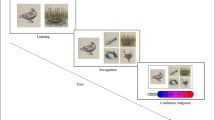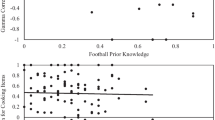Abstract
The present study was conducted to examine developmental progression in children’s metacognitive monitoring competencies in the context of a complex memory task. 7- and 9-year-olds rated their confidence after answering questions in two different question formats (unbiased and misleading) and two different question types (answerable and unanswerable). Feeling-of-knowing judgments were gathered for questions that had previously been answered with “don’t know.” The results showed that children from both age groups appropriately differentiated between correct and incorrect answers to unbiased questions in their confidence judgments, between answerable and unanswerable questions, and appropriately showed lower confidence levels in their confidence judgments than in their feeling-of-knowing judgments. 9-year-olds proved to be further able to discriminate metacognitively between correct and incorrect answers to misleading answerable questions in their confidence judgments while 7-year-olds were not. The comparison of feeling-of-knowing judgments before correct and incorrect recognition indicated that metacognitive differentiation at the lower end of the uncertainty–certainty continuum posed problems for these age groups. The observation of an adult confederate modeling appropriate metamemory monitoring did not improve children’s metacognitive performance.



Similar content being viewed by others
References
Allwood, C. M., Jonsson, A.-C., & Granhag, P. A. (2005). The effects of source and type of feedback on child witnesses’ metamemory accuracy. Applied Cognitive Psychology, 19, 331–344.
Bandura, A. (1969). Principles of behavior modification. Oxford: Holt, Rinehart, & Winston.
Bjorklund, D. F., & Bering, J. M. (2002). The evolved child: Applying evolutionary developmental psychology to modern schooling. Learning and Individual Differences, 12, 347–373.
Butterfield, E. C., Nelson, T. O., & Peck, V. (1988). Developmental aspects of the feeling of knowing. Developmental Psychology, 24, 654–663.
DeMarie, D., & Ferron, J. (2003). Capacity, strategies, and metamemory: Test of a three-factor model of memory development. Journal of Experimental Child Psychology, 84, 167–193.
Dunlosky, J., Rawson, K. A., & Middleton, E. L. (2005). What constrains the accuracy of metacomprehension judgments? Testing the transfer-appropriate-monitoring and accessibility hypotheses. Journal of Memory and Language, 52, 551–565.
Flavell, J. H. (1979). Metacognition and cognitive monitoring: A new area of cognitive-developmental inquiry. American Psychologist, 34, 906–911.
Granhag, P. A., Strömwall, L. A., & Allwood, C. M. (2000). Effects of reiteration, hindsight bias, and memory on realism in eyewitness confidence. Applied Cognitive Psychology, 14, 397–420.
Howie, P., & Roebers, C. M. (2006). Developmental progression in the confidence-accuracy relationship in event recall: New insights provided by a calibration perspective. Applied Cognitive Psychology (in press).
Ibabe, I., & Sporer, S. L. (2004). How you ask is what you get: On the influence of question form on accuracy and confidence. Applied Cognitive Psychology, 18, 711–726.
Koriat, A., & Goldsmith, M. (1996). Monitoring and control processes in the strategic regulation of memory accuracy. Psychological Review, 103, 490–517.
Koriat, A., & Goldsmith, M. (1998). The role of metacognitive processes in the regulation of memory performance. In G. Mazzoni & T. O. Nelson (Eds.), Metacognition and cognitive neuropsychology (pp. 97–118). Mahwah, NJ: Erlbaum.
Koriat, A., Ma’ayan, H., Sheffer, L., & Bjork, R. A. (2006). Exploring a mnemonic debiasing account of the underconfidence-with-practice effect. Journal of Experimental Psychology: Learning, Memory, and Cognition, 32, 595–608.
Lockl, K., & Schneider, W. (2002). Developmental trends in children’s FOK judgments. International Journal of Behavioral Development, 26, 327–333.
Lockl, K., & Schneider, W. (2003). Metakognitive Überwachungs- und Kontrollprozesse bei der Lernzeiteinteilung von Kindern. Zeitschrift für Pädagogische Psychologie, 17, 173–183.
Maki, R. H., Shields, M., Wheeler, A. E., & Zacchilli, T. L. (2005). Individual differences in absolute and relative metacomprehension accuracy. Journal of Educational Psychology, 97, 723–731.
Maki, R. H., & Swett, S. (1987). Metamemory for narrative text. Memory & Cognition, 15, 72–83.
Migueles, M., & Garcia-Bajos, E. (1999). Recall, recognition and confidence patterns in eyewitness testimony. Applied Cognitive Psychology, 13, 257–268.
Nelson, T. O. (1984). A comparism of current measures of the accuracy of feeling-of-knowing predictions. Psychological Bulletin, 95, 109–133.
Nelson, T. O., & Narens, L. (1990). Metamemory: A theoretical framework and new findings. In G. Bower (Ed.), The Psychology of Learning and Motivation: Advance in Research and Theory (Vol. 26, pp. 125–173). New York: Academic.
Nelson, T. O., & Narens, L. (1994). Why investigate metacognition? In A. P. Shimamura & J. Metcalfe (Eds.), Metacognition: Knowing about knowing (pp. 1–25). Cambridge, MA: MIT.
Nolan, J., & Markham, R. (1998). The accuracy–confidence relationship in an eyewitness task: Anxiety as a modifier. Applied Cognitive Psychology, 12, 43–54.
Perfect, T., & Hollins, T. (1999). Feeling-of-knowing judgments do not predict subsequent recognition performance for eyewitness memory. Journal of Experimental Psychology: Applied, 5, 250–264.
Pierce, S. H., & Lange, G. (2000). Relationships among metamemory, motivation and memory performance in young school-age children. British Journal of Developmental Psychology, 18, 121–135.
Pressley, M., Levin, J. R., Ghatala, E. S., & Ahmad, M. (1987). Test monitoring in young grade school children. Journal of Experimental Child Psychology, 43, 96–111.
Renner, C. H., & Renner, M. J. (2001). But I thought I knew that: Using confidence estimation as a debiasing technique to improve classroom performance. Applied Cognitive Psychology, 15, 23–32.
Robinson, M. D., Johnson, J. T., & Robertson, D. A. (2000). Process versus content in eyewitness metamemory monitoring. Journal of Experimental Psychology: Applied, 6, 207–221.
Roebers, C. M. (2002). Confidence judgments in children’s and adults’ event recall and suggestibility. Developmental Psychology, 38, 1052–1067.
Roebers, C. M., & Fernandez, O. (2002). The effects of accuracy motivation on children’s and adults’ event recall, suggestibility, and their answers to unanswerable questions. Journal of Cognition and Development, 3, 415–443.
Roebers, C. M., & Howie, P. (2003). Confidence judgments in event recall: Developmental progression in the impact of question format. Journal of Experimental Child Psychology, 85, 352–371.
Roebers, C. M., von der Linden, N., & Howie, P. (2006). Favourable and unfavourable conditions for children’s confidence judgments. British Journal of Developmental Psychology (in press).
Roebers, C. M., von der Linden, N., Howie, P., & Schneider, W. (2006). Children’s metamemorial judgments in an event recall task. Journal of Experimental Child Psychology (in press).
Schneider, W. (1998). The development of procedural metamemory in childhood and adolescence. In G. Mazzoni & T. O. Nelson (Eds.), Metacognition and cognitive neuropsychology: Monitoring and control processes (pp. 1–21). Mahwah, NJ: Erlbaum.
Schneider, W., & Bjorklund, D. F. (1998). Memory. In W. Damon (Ed.), Handbook of child psychology: Volume 2: Cognition, perception, and language (pp. 467–521). New York: Wiley.
Schneider, W., Schlagmüller, M., & Visé, M. (1998). The impact of metamemory and domain-specific knowledge on memory performance. European Journal of Education, 13, 91–103.
Schraw, G., Potenza, M. T., & Nebelsick-Gullet, L. (1993). Constraints on the calibration of performance. Contemporary Educational Psychology, 18, 455–463.
Schreblowski, S., & Hasselhorn, M. (2001). Zur Wirkung zusätzlicher Motivveränderungskomponenten bei einem metakognitivem Textverarbeitungstraining. Zeitschrift für Pädagogische Psychologie, 15, 145–154.
Schwanenflugel, P. J., Henderson, R. L., & Fabricius, W. V. (1998). Developing organization of mental verbs and theory of mind in middle childhood: Evidence from extensions. Developmental Psychology, 34, 512–524.
Schwarz, S., & Roebers, C. M. (2006). Developmental progression in the effects of social influence on children’s eyewitness performance and their metacognitive monitoring. Journal of Experimental Child Psychology, 94, 229–248.
Schwarz, S., Roebers, C. M., & Schneider, W. (2004). Entwicklungsveränderungen in Konformität und in kognitiven Folgen sozialer Beeinflussung. Zeitschrift für Entwicklungspsychologie und Pädagogische Psychologie, 36, 173–181.
Waterman, A. H., Blades, M., & Spencer, C. (2001). Interviewing children and adults: The effect of question format on the tendency to speculate. Applied Cognitive Psychology, 15, 521–531.
Waterman, A. H., Blades, M., & Spencer, C. (2004). Indicating when you do not know the answer: The effect of question format and interviewer knowledge on children’s ‘don’t know’ responses. British Journal of Developmental Psychology, 22, 335–348.
Wellman, H. M. (1977). Preschoolers’ understanding of memory-relevant variables. Child Development, 48, 1720–1723.
Zabrucky, K., & Ratner, H. H. (1986). Children’s comprehension monitoring and recall of inconsistent stories. Child Development, 57, 1401–1418.
Acknowledgements
The present study was conducted as part of a research project on metacognitive factors involved in children’s event recall that is financed through a grant to the second author by the German Research Foundation (DFG-Gz. RO 1324/3-1). We grateful acknowledge the valuable comments from Kathrin Lockl, an outstanding expert in this field of research, on an earlier version of this article. We wish to thank Susanne Ebert and Yvonne Metz for their help with the data collection as well as the children, teachers, principals and parents for their cooperation and participation.
Author information
Authors and Affiliations
Corresponding author
Rights and permissions
About this article
Cite this article
von der Linden, N., Roebers, C.M. Developmental changes in uncertainty monitoring during an event recall task. Metacognition Learning 1, 213–228 (2006). https://doi.org/10.1007/s11409-006-9001-6
Received:
Revised:
Accepted:
Published:
Issue Date:
DOI: https://doi.org/10.1007/s11409-006-9001-6




